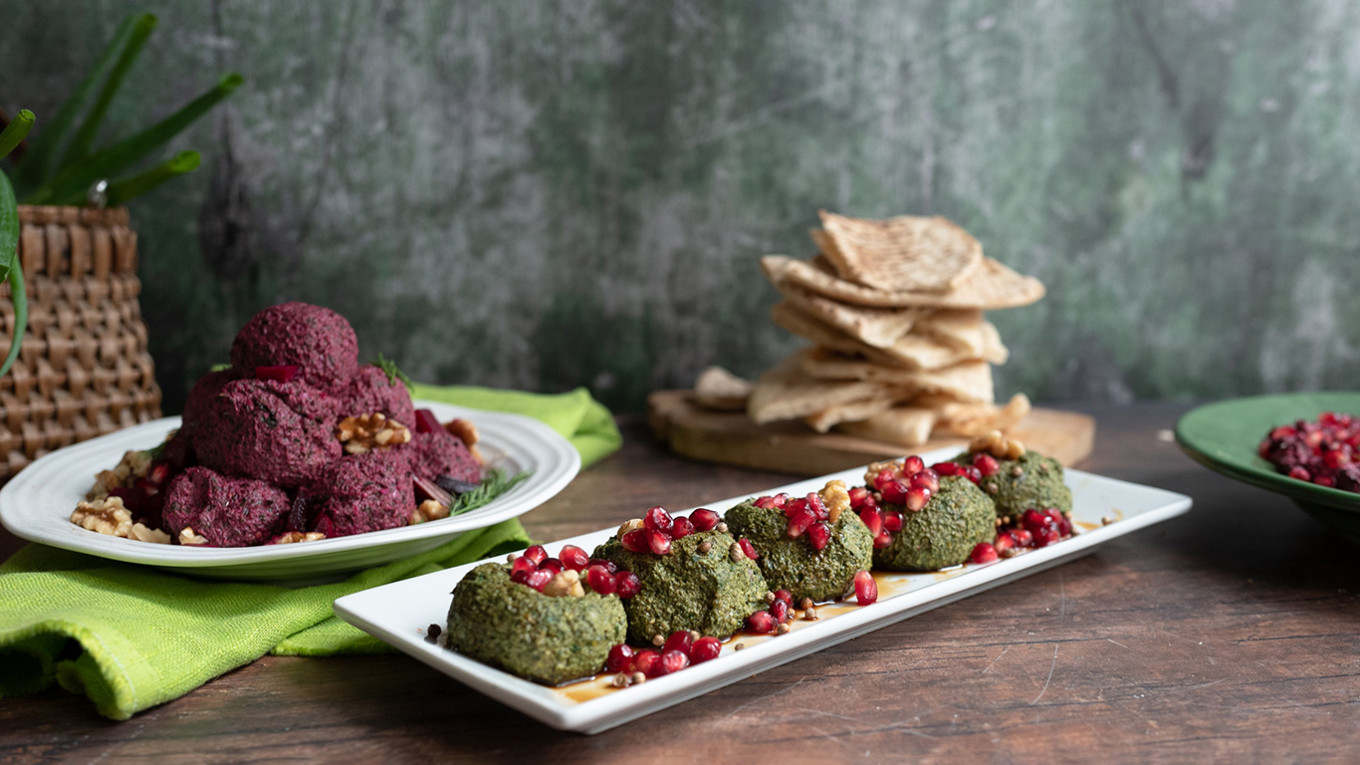I am an inveterate hoarder of dark leafy greens. I consume baby spinach nearly every day, and the hardier winter spinach invariably finds itself in some cooking project or other, be it soup, smoothie, or spanakopita. I am helpless to resist the vibrant jewel tones of rainbow chard, kale, and my beloved beet greens. But now that warmer weather has relieved the balcony of its double duty as extra cold storage, refrigerator space in our house is at a premium. I often find myself with far too many bunches of lovely greens than I can store, and that’s when I pull out the food processor to turn this extra bounty into a denser, storable, and delectable Georgian pkhali, or vegetable and walnut pâté.
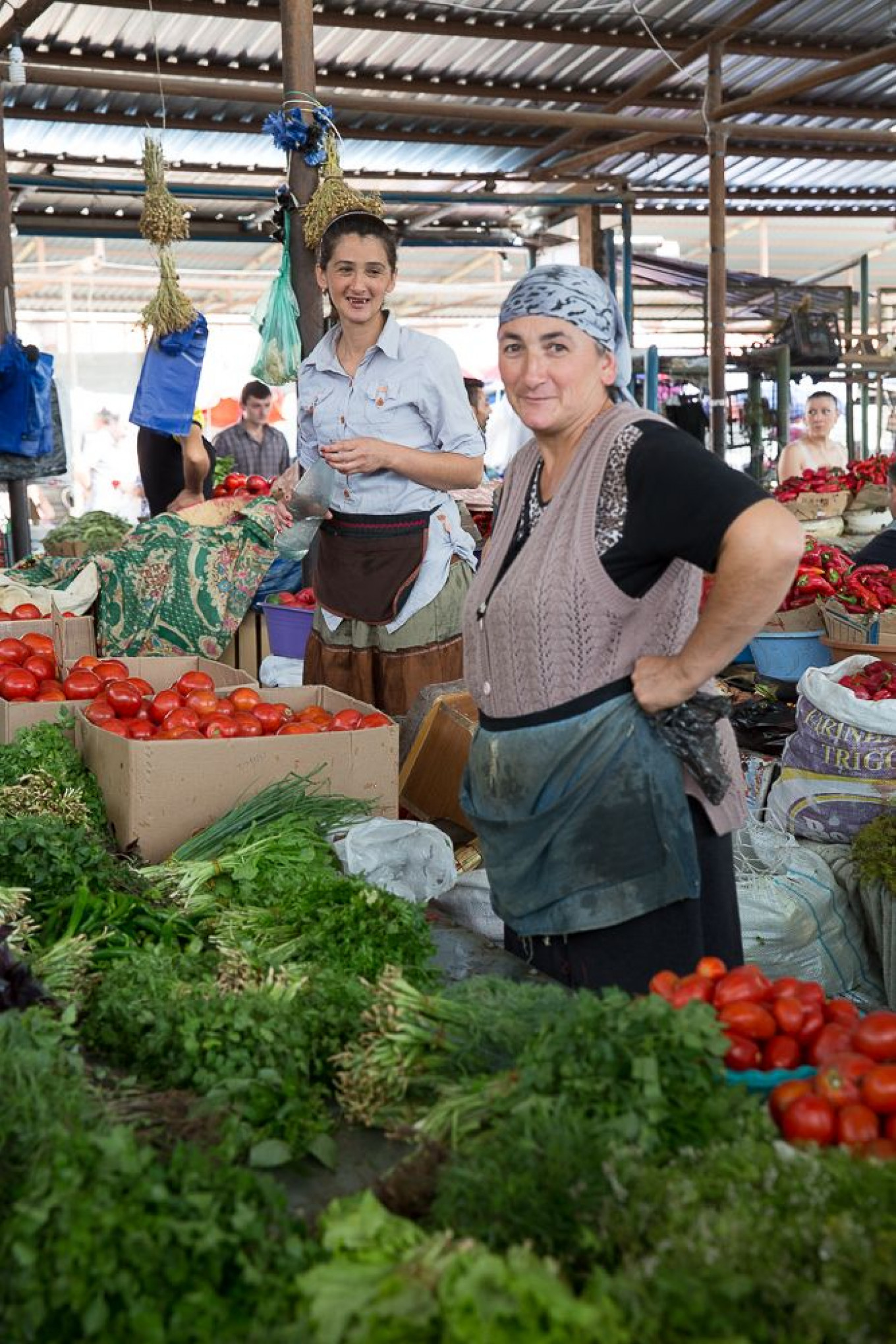
For millennia, Georgia’s position at the crossroads of the Silk Road, bridging east and west, has encouraged her country’s cooks to absorb the flavors and cooking methods of her neighbors and invaders, including the Greeks, Persians, Turks, and ultimately Russians. Happily, none of these occupiers ever vanquished Georgia’s essential cuisine or its core value of expansive hospitality, but dishes such as pkhali reflect a strong Persian influence with its Zoroastrian balance of “hot” and “cold” foods. Nuts, herbs (except cilantro), spices, and vinegar — the “hot” ingredients — pair with the “cold” ingredients, in this case, vegetables and cilantro, in one balanced, healthy, and delicious dish. Pkhali captures the signature Georgian notes of mouth-puckering tartness, contrasted with the sweet and umami flavors of nuts and vegetables. Pkhali is also spiked with Khmeli suneli, Georgia’s inimitable space blend, one whiff of which immediately transports one to a balmy evening, perhaps under a pergola, where a long table is already set with many dishes, including pkhali, a regiment of wine bottles breathes in anticipation, and perhaps somewhere someone is tuning an accordion, all gearing up for the classic Georgian supra or banquet: a long evening of food, wine, toasts, music, and fellowship.
Pkhali is a consummately eye-catching dish, usually served at the beginning of the expansive Georgian supra, molded into small discs or spread on a shallow dish, studded with pomegranate seeds and walnuts — the deep contrasting hues making it as pleasing to the eye as it is to the taste. But pkhali can also be made with beets (and their greens), and in this iteration they become a deep lavender. I have also enjoyed mushroom, leek, cabbage pkhali, as well as the popular Georgian eggplant rolls filled with the walnut paste, which is the base of pkhali.
The good news is that you don’t have to wait for a full-blown Georgian supra to enjoy this addictive spreadable. Though some die-hard cooks stubbornly refuse to give up that essential piece of traditional Georgian kitchen kit, the mortar and pestle, pkhali comes together easily in the food processor, and is wonderfully adaptable to anything you have in the vegetable crisper that needs using up. Toss in a bunch of wilting arugula, the end of a bunch of dill, some leftover mint, or unused celery leaves — all work well.
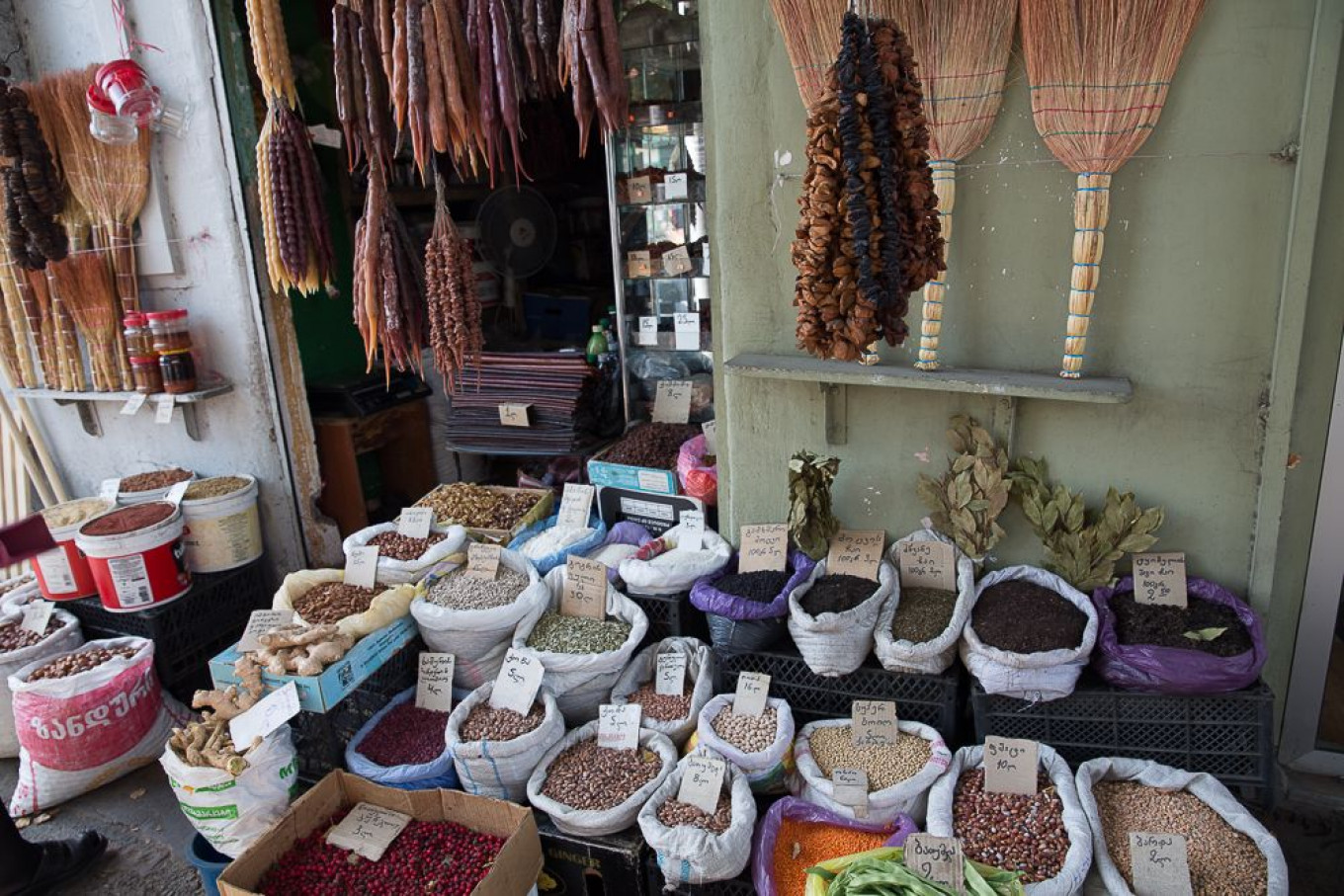
Pkhali is a welcome dish all year round, but especially now as the weather gets warmer, and, when possible, dining moves outside to the open air in the fine Georgian tradition. As early spring rolls into summer, I happily cede preparation of the main course — the meat — to my husband, who presides over the mangal with flair and authority. This leaves me free to focus on the spreadables and salads. Often, I just set out some pkhali, bread, a dish of olives, and a plate of fresh herbs; we open a bottle of wine, and if we never get around to lighting the mangal, so be it! And on these long, warm evenings, it’s nice to let pkhali steal the show without the pressure of pacing oneself for the parade of Georgian showstoppers — khachapuri, Khinkali, satsivi, chicken Tabaka, and other delectable dishes — that flow incessantly from the first course of a supra. This way, I can indulge in pkhali to my heart’s content!
But don’t wait until the sun goes down, either! Pkhali is also great for breakfast and lunch: spread it on toast and top it with yogurt or labneh, scoop a spoonful into a grain bowl, stuff it into a pita with lots of fresh greens and sliced cucumbers, or top a fresh avocado with pkhali and hit it with a spritz of lime. In each case, pkhali will turn a possibly boring or lackluster meal or snack into a treat. So, go ahead— buy an extra bunch of vibrant greens or that third bunch of beets with their stalks and leaves and let pkhali steal the show. You’ll be glad you did.
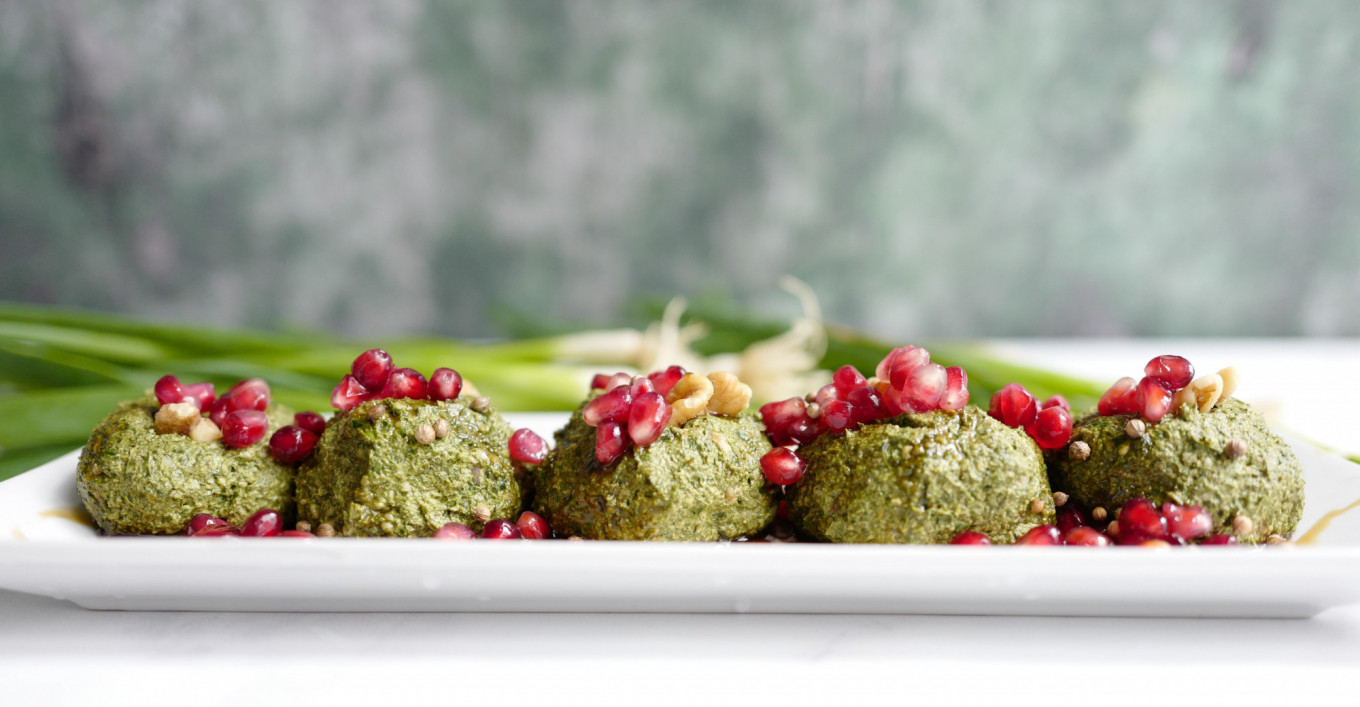
Spinach Pkhali (Ispanakhi Pkhali)
Ingredients
- 6 cups (1-½ liters) hardy “winter” spinach, stems removed and well washed*
- 2 cups (475 ml) walnuts
- ¼ cup (60 ml) white vinegar
- One half of a small onion, thinly sliced
- 3-4 cloves of garlic, green stem removed and grated
- 1 cup (240 ml) chopped cilantro
- ¼ cup (60 ml) chopped lovage (or celery leaves)
- ¼ cup (60 ml) chopped mint
- 2 tsp Utskho suneli (blue fenugreek)
- 2 Tbsp Khmeli suneli**
- 2 tsp olive oil
- Salt to taste
For garnish
- Chopped walnuts
- Pomegranate seeds
Instructions
- Bring a large pot of well-salted water to a rolling boil and fill a large mixing bowl with ice water.
- Blanch the washed spinach in the boiling water for 1 minute, then immediately transfer it to the ice water. When cool, transfer the spinach to a clean towel and wring out as much liquid as possible.
- Soak the onion in the ice water for 10 minutes.
- Place the walnuts and garlic in a food processor fitted with a metal blade and pulse to combine until the mixture takes on the texture of coarse sand. Add the spinach and remaining ingredients and mix for 2 minutes to combine until smooth. Add another teaspoon of olive oil if the mixture needs more liquid. Taste and adjust seasoning with salt to your liking.
- Let the mixture sit at room temperature for 2-3 hours, then refrigerate for at least 3 hours — the flavors will only improve with time.
- Serve in small round disks, studded with walnuts and pomegranate seeds, or spread it out on a large plate and sprinkle the nuts and seeds on top. Serve with a flat bread such as lavash.
*Baby spinach does not work as well for this recipe. Substitute rainbow chard if you cannot find winter spinach.
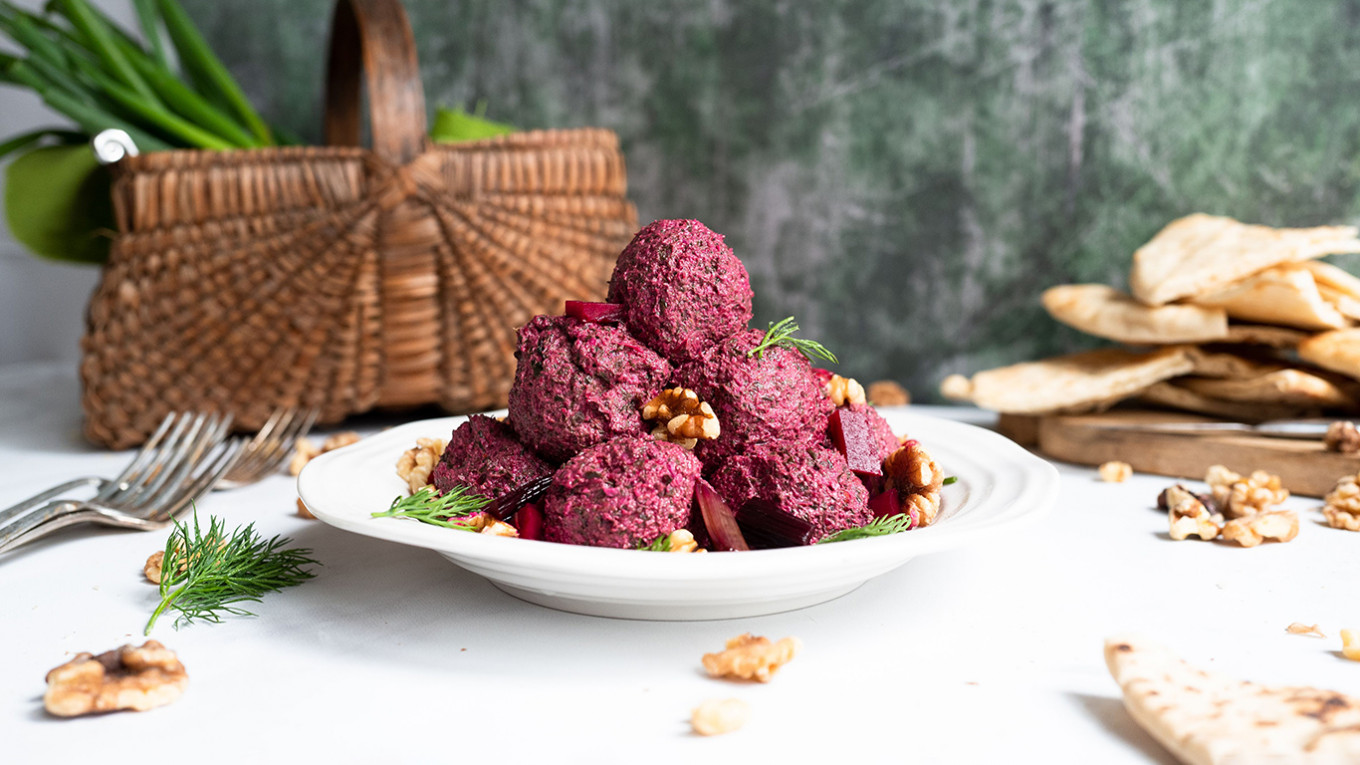
Beet Pkhali (Charkhlis Pkhali)
Ingredients
- 4 cups (950 ml) beetroot leaves (or a combination of beetroot leaves and chard), well rinsed and dried. Reserve the stems for pickling and garnishing
- 1 Tbsp olive oil
- 2 cloves of garlic, green stem removed and roughly chopped
- 1 medium-sized beet
- 2 cups (275 ml) walnuts
- ¼ cup (60 ml) white vinegar
- 1 bunch scallions, chopped
- 2 Tbsp pomegranate syrup
- 2 tsp Utskho suneli (blue fenugreek)
- 2 Tbsp Khmeli suneli**
- 1 cup (240 ml) chopped cilantro
- ½ cup (120 ml) chopped dill
- ¼ cup (60 ml) chopped mint
- ¼ cup (60 ml) chopped parsley
- Salt to taste
For garnish
Pickled beet stems, walnuts, dried and cracked coriander seeds, and more fresh dill and cilantro. Drizzle with pomegranate syrup.
Instructions
- Preheat the oven to 400ºF (205ºC). Wrap the beet loosely in foil and roast for 30 minutes, or until the point of a sharp knife slides easily into the beet. Set aside to cool, then peel and chop the beet.
- Heat the olive oil in a large skillet, then sauté the garlic with the beet greens until they wilt. Set aside to cool.
- Place the walnuts and scallions in a food processor fitted with a steel blade and pulse until the mixture resembles coarse sand.
- Squeeze the sautéed beet greens to remove as much liquid as you can. Then add the greens, beet, and remaining ingredients to the food processor and process for 1-2 minutes until the pkhali is smooth.
- Let the mixture sit at room temperature for 2-3 hours, then refrigerate for at least 3 hours — the flavors will only improve with time.
- Serve spread out on a plate, or made into small round disks, studded with walnuts and pickled beet stems, cracked coriander seeds, and a drizzle of pomegranate syrup. Serve with a flat bread such as lavash.
**Khmeli suneli is a signature Georgian spice mix, containing coriander, marigold petals, blue fenugreek, cinnamon, allspice, and dill seed. It is available from online spice retailers and well worth the trouble to find.
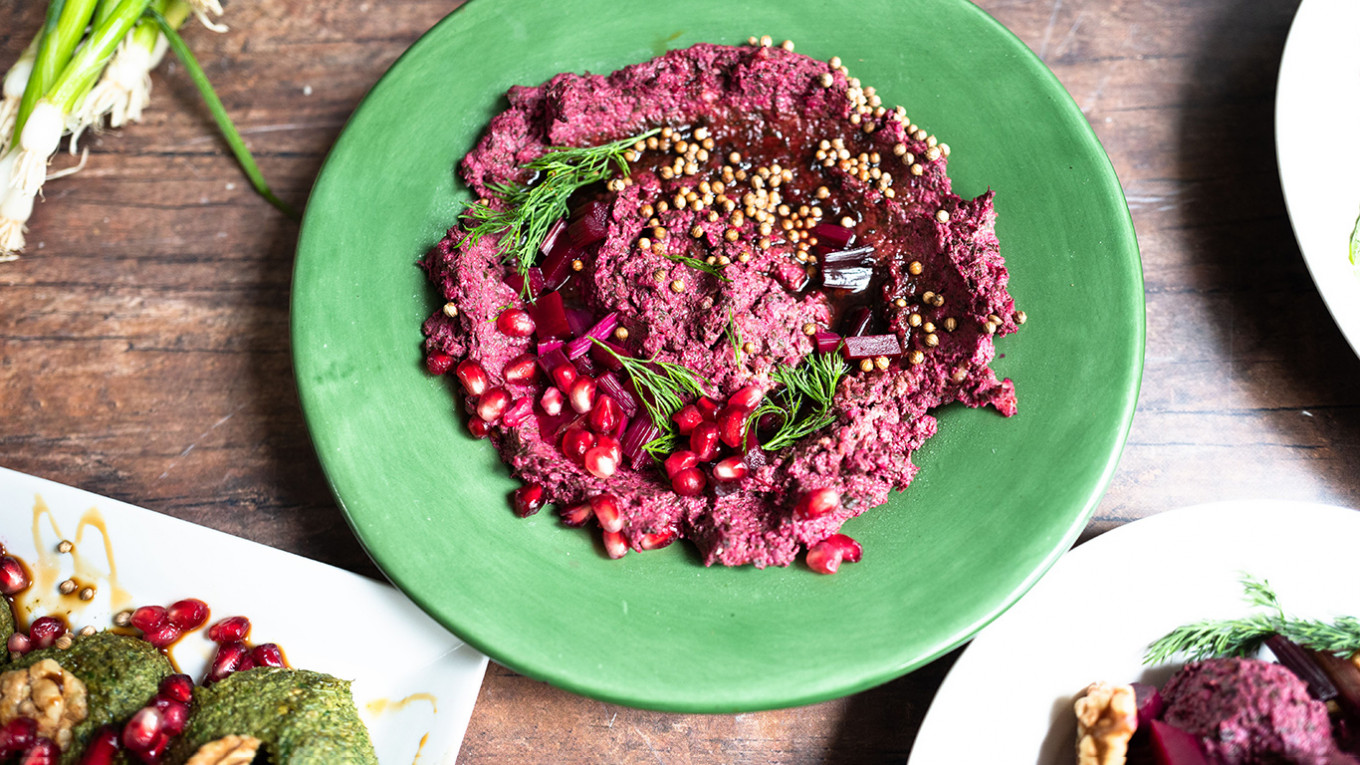
Pickled Beet Stems
Ingredients
- 3 cups beet stems (or a combination of beet stems and roasted beets) in a fine dice
- 3 pieces star anise
- 1 cinnamon stick
- 3 sprigs thyme
- 1 Tbsp allspice
- 1 Tbsp coriander seeds
- ¼ cup salt
- ⅛ cup sugar
- 2 cups red wine or apple cider vinegar
Instructions
- Place the star anise and cinnamon stick at the bottom of a clean heat-proof glass jar, then fill it up with the beet stems.
- Combine the remaining ingredients into a small pot and simmer until the salt and sugar have dissolved. Pour the hot mixture over the beets, let the mixture cool to room temperature, then cover and refrigerate. The pickled stems will last about 8-10 days in the fridge.
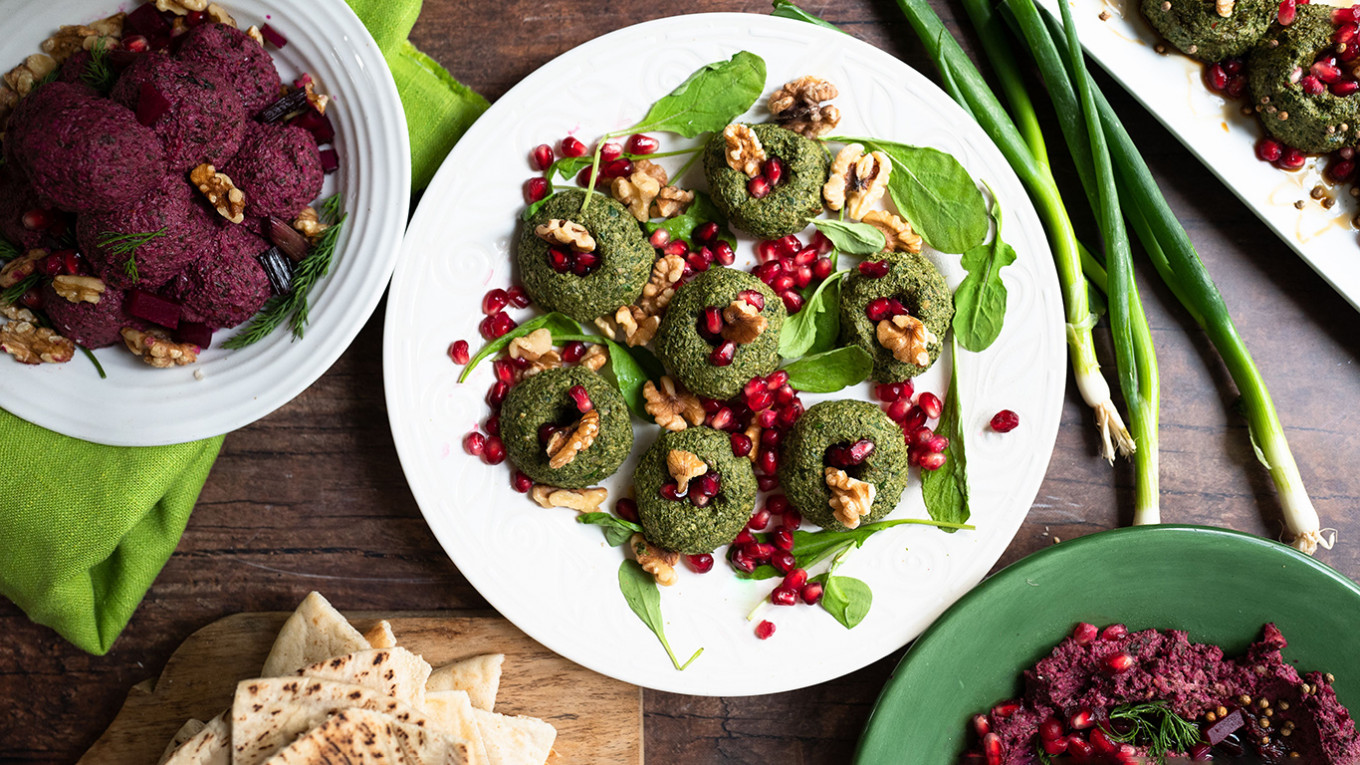
A Message from The Moscow Times:
Dear readers,
We are facing unprecedented challenges. Russia's Prosecutor General's Office has designated The Moscow Times as an "undesirable" organization, criminalizing our work and putting our staff at risk of prosecution. This follows our earlier unjust labeling as a "foreign agent."
These actions are direct attempts to silence independent journalism in Russia. The authorities claim our work "discredits the decisions of the Russian leadership." We see things differently: we strive to provide accurate, unbiased reporting on Russia.
We, the journalists of The Moscow Times, refuse to be silenced. But to continue our work, we need your help.
Your support, no matter how small, makes a world of difference. If you can, please support us monthly starting from just $2. It's quick to set up, and every contribution makes a significant impact.
By supporting The Moscow Times, you're defending open, independent journalism in the face of repression. Thank you for standing with us.
Remind me later.



